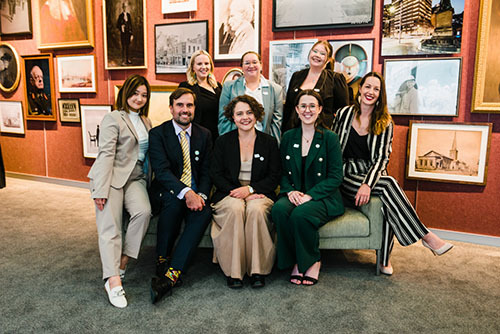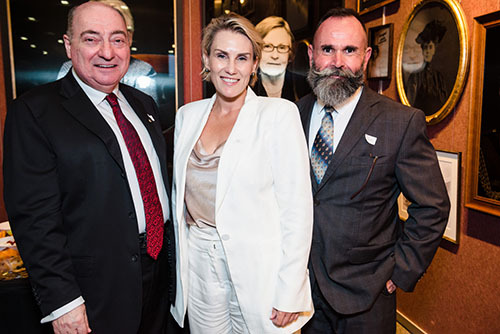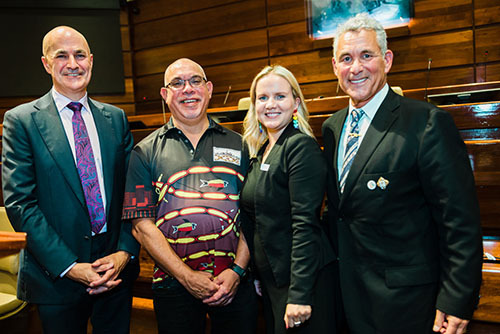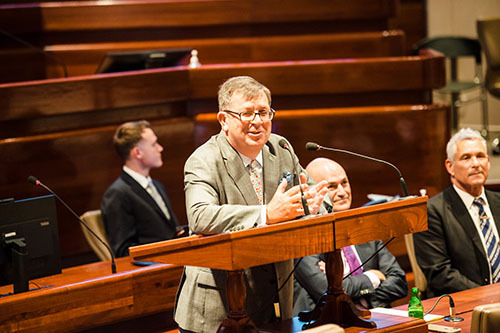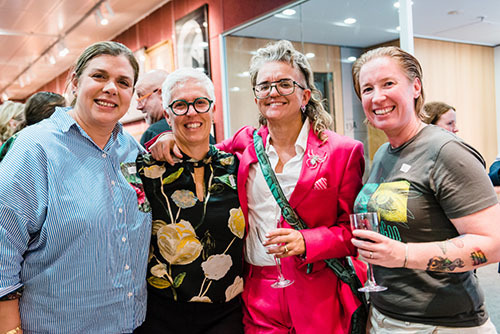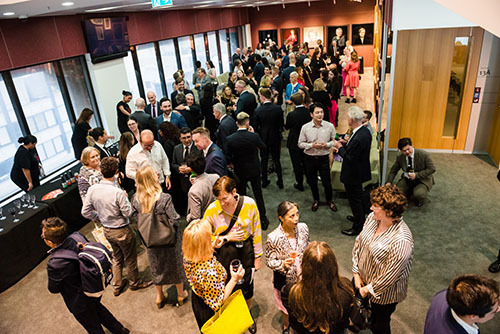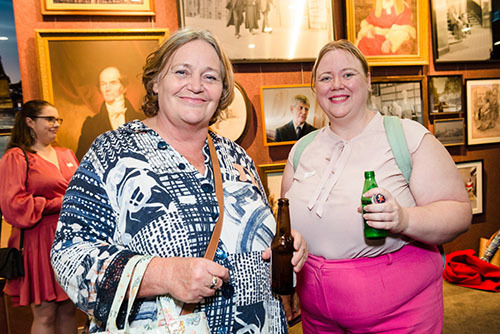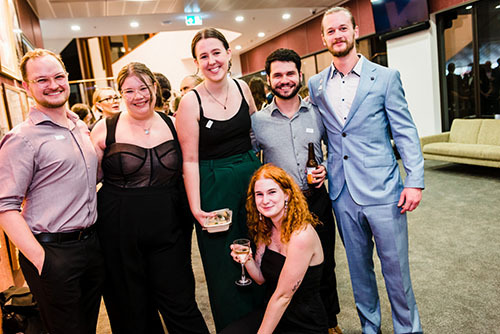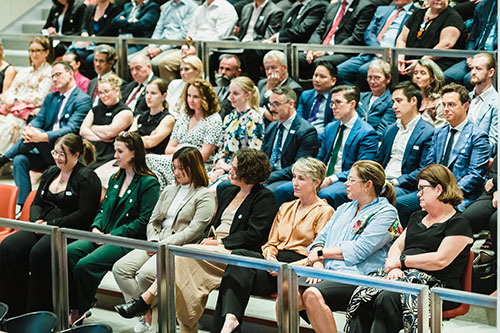- Winter 2024
- Pride in Law
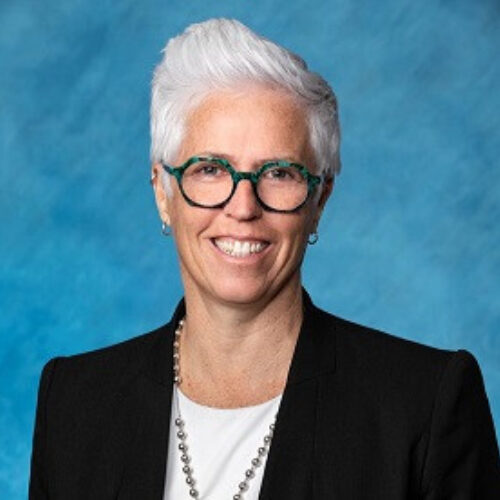
Justice Richard Weinstein commenced practising at the New South Wales Bar in early 1993. During his career at the Bar, he was called a ‘poofter’ in open court in the presence of a judge, a court officer and other legal practitioners. This occurred on at least two occasions and came from the mouths of other barristers. For many years, his Honour’s colleagues gave little if any proper recognition to his relationship with his now husband of 30 years. At times his Honour felt he was the only gay person in the Phillip Street village.
In 1994, Justice Jeremy Kirk, a then closeted gay man, doubted the credibility of a movie depiction of loving and supportive family acceptance of gay family members. When he did come out, his Honour’s parents were concerned his legal career would be harmed by his open identification as a gay man. His Honour’s experience does not speak to that concern eventuating. However, without doubt, it is a fear many legal practitioners of the lesbian, gay, bisexual, transgender, intersex, queer, questioning, and asexual (LGBTIQA+) community continue to feel today.
These events are jarring lived experiences of LGBTIQA+ members of the New South Wales Bench when practising as barristers, and are experiences not defeated by the passage of time.
Around the surrounds of Phillip Street, I have heard – both directly and indirectly – the expression ‘that’s so gay’ when describing some occurrence. To speak of ‘gay’ in that sense was not to hold pride in oneself but was describing something to be disparaged. The word ‘poofter’ continues to be used to intentionally demean someone. As a profession, we have not yet educated ourselves on the appropriate and respectful form of address for non-binary persons.
Pride in Law is Australia’s national LGBTIQA+ law association. It is a non-political association, aimed at connecting LGBTIQA+ members of the legal community and their allies. The aim is to bring together the LGBTIQA+ legal profession across multiple disciplines. On 20 March 2024, in the Banco Court of the Supreme Court of New South Wales, Pride in Law celebrated the official launch of its New South Wales chapter. The evening featured addresses by Justice Weinstein and Justice Kirk, and it was at this launch that the above experiences of their Honours were disclosed. The event was attended by many members of the LGBTIQA+ legal community and their allies. As recognised at the launch, there are and have been many wonderful LGBTIQA+ allies within our legal community who have helped, and often been part of, the breaking down of systemic, discriminatory barriers.
As an openly queer identifying person, I have, on occasion, been asked by colleagues whether there is a need for the continual recognition and public statements by the New South Wales Bar in support of the LGBTIQA+ community. I am asked whether there is a need for organisations such as Pride in Law. The question appears derived from the current (and presumed) continuing recognition of de facto relationships, anti-discrimination laws to protect the LGBTIQA+ community in the workplace and in most aspects of society, and the availability of marriage (thus allowing us queers to make the same mistakes as everyone else). As Justice Kirk stated, ‘that does not mean that the road to equality and acceptance has ended in a neat and quiet cul de sac, in a marital home with clipped lawn and white picket fence’, observing, ‘there are others in the LGBTIQA+ community who may have a harder fight than we have done, and who will benefit from organisations who support and promote the interests of all members of that community. Moreover, experience in the United States illustrates that rights, once granted, even taken for granted, can be removed.’
I add, equality at law does not necessarily make for actual equality in society, or equality of acceptance by peers, or equality in briefing among those identifying with the LGBTIQA+ community at the New South Wales Bar. For many people, it does not mean acceptance by their families, religious and faith communities, and the medical profession. Such is evident by a second event that took place on 20 March 2024, an event that was itself recognised at the launch of Pride in Law.
On 20 March 2024, while the Supreme Court of New South Wales welcomed and embraced diversity within the legal profession, the New South Wales Government debated banning gay conversion therapy. Following a marathon parliamentary debate, the Bill was passed with 22 votes in favour and four against. Four of our democratically elected representatives thought fit to oppose criminalising gay conversion as well as making it illegal for people to be taken out of New South Wales to undergo the controversial therapy. There is somewhat of an irony that the celebration of Pride in Law New South Wales Chapter was simultaneously being met with opposition to a law that would operate to instil acceptance and pride in oneself.
Notwithstanding positive change and advancements to protect and promote equality of all persons regardless of their sexuality and gender, there continues a need to provide safe spaces and supportive environments in our profession that will both encourage the visibility of diversity within the New South Wales legal profession and allow for the success of minority groups in their practices and careers.
While Pride in Law is a non-political organisation, its presence holds a strong political and social message to current and future legal professionals: queer identity has a place in the law and a right to be in the law, and the LGBTIQA+ community will be supported in gaining that seat at that legal table.
Congratulations to Pride in Law on the establishment of its New South Wales chapter. I look forward to another glass of bubbles and a good yarn at the next Pride in Law event.
Photo Credit: Michael Zanetti
